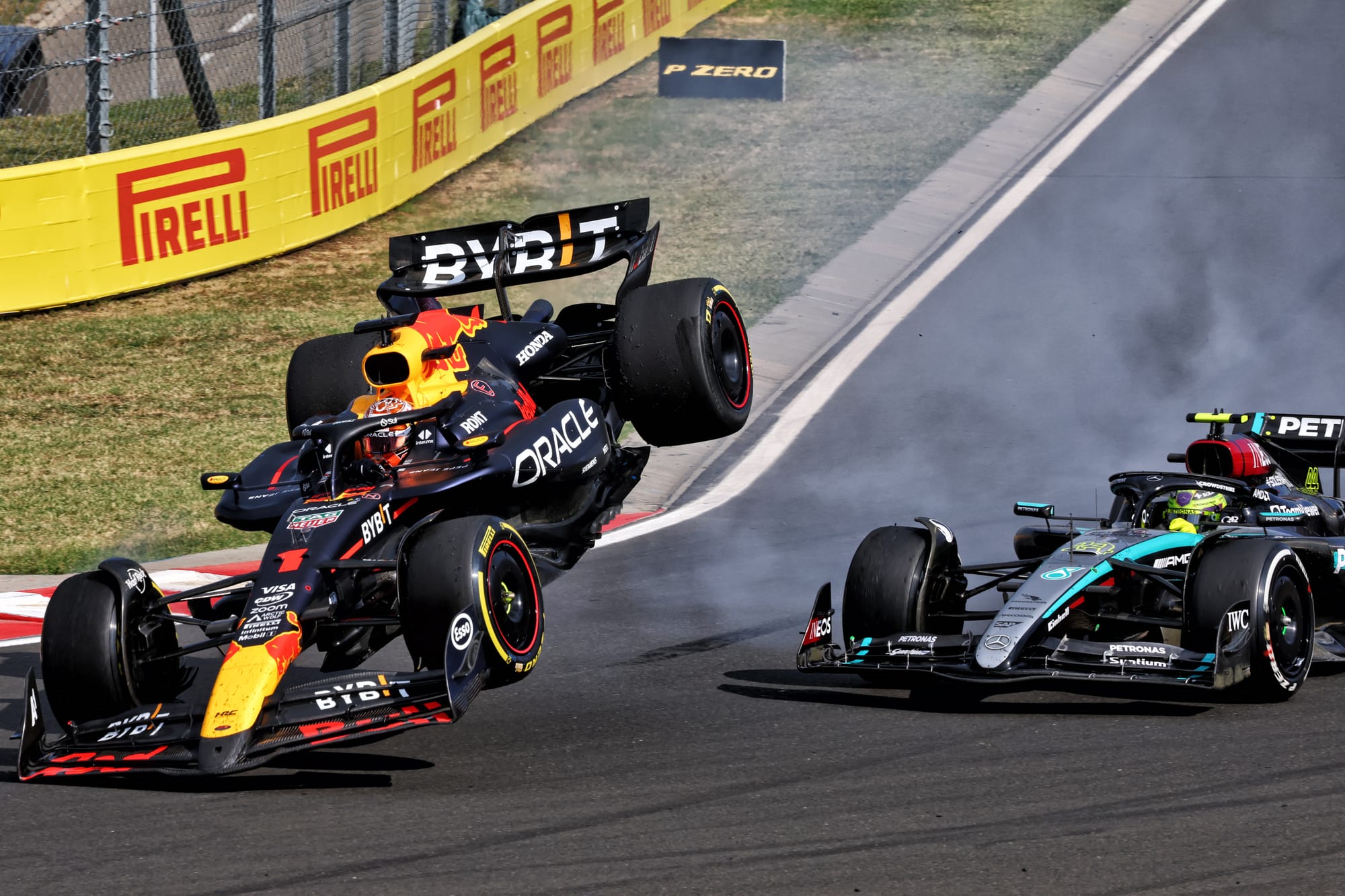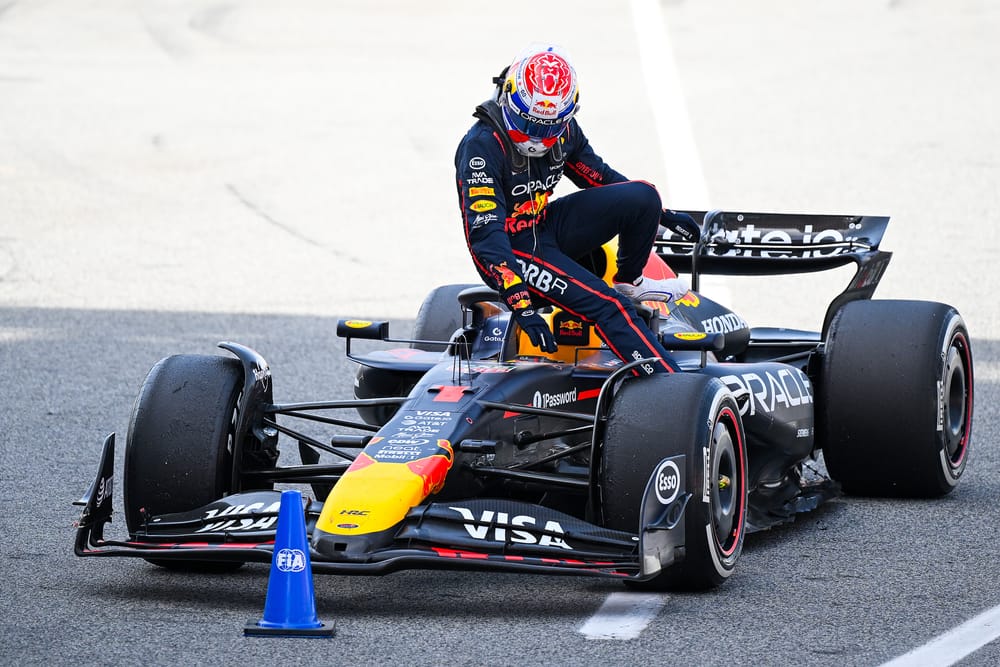Max Verstappen does not really do apologies. He rarely backtracks, he never panders. So when he admits that something "shouldn't have happened" – as he did after his clash with George Russell in Formula 1's Spanish Grand Prix – it is significant.
Verstappen's frustration about the way the end of the Barcelona race played out took a while to subside, and he was in no mood to discuss it at length afterwards, but there were signs of contrition well before his Monday morning statement on social media in which he admitted it was "not right and shouldn't have happened".
He let Russell back by (properly) later in the lap after lunging and hitting the Mercedes driver, for example. Verstappen would not do that just for the sake of it.
And on Sunday evening he eventually labelled his move a "misjudgement" - a diplomatic choice in the middle of his written press session after initially dodging questions about whether it was deliberate in television interviews, but noteworthy all the same, as it was an initial if vague acknowledgement he had got it wrong.
Then when he went a step further and said the clash shouldn't have happened, it marked a greater departure from his usual playbook. This was, by Verstappen standards, as close as it gets to contrition.
It wasn't a full-blown apology, but it was unmistakably a greater admission of fault - and the timing of it meant it cut through the various other noise that had emerged on Sunday evening, helping make Verstappen's message clear.
It was a revealing moment for a driver who, historically, doubles down if he believes he was in the right. If he knows he's in the wrong, he usually lets others make that judgement and says little, while Red Bull often deploys the "racing incident" label.
Verstappen doing some low-effort holding up of his hands does not mean he will suddenly become a different racing driver. He is aggressive, uncompromising, and capable of those sudden losses of control that occasionally make him volatile. He will continue to be those things because they are the flip side of the emotion, commitment and quality that makes him one of F1's greatest drivers.
But Verstappen's also human, a straightforward person, one who is capable of much more empathy than some give him credit for - and he is also emotionally and intellectually intelligent. He will have swiftly been aware of the tone of the reaction on Sunday already in Spain, and the key question: was it deliberate?
That narrative gained enough traction that Verstappen may have felt compelled to clarify, having recognised he did not say much in the initial aftermath. Of course, it may have been a forced message that Verstappen doesn't believe. But when have you ever known Verstappen to parrot such a message, especially one that means he has to accept fault for something? Something as specific as that does not appear on his own page by accident.
If the assumption building was that he'd intentionally driven into Russell, then Verstappen has made a swift and smart move to de-escalate. Because there was intent in that move. But what kind? Verstappen wasn't trying to wipe Russell out. He was not wildly out of control. Clearly, though, he was trying to force Russell wide, and make a point, maybe even exact a bit of retribution in the heat of a frustrating race.
He also probably didn't care if they clashed. We've seen that before. But that is not the same as deliberately causing an accident. It's dark arts gone wrong, not a deliberate demolition derby.

And the context matters. Verstappen had already been pushed to the limit by Red Bull's strategy. It had clear echoes of Hungary last year - when Verstappen feels let down or put in a position where he has to rescue the situation alone, he can snap. He stops caring about the bigger picture. He's capable of a retaliatory lash-out.
But he's also capable of self-awareness. In this case, Verstappen knew he was in the wrong. And he was willing to say as much. That doesn't excuse what he did, or justify it, and it doesn't excuse or justify any repeats in the future.
All it does is make the situation seem a little less binary than the harshest critics made out. Disqualifying Verstappen for that would achieve little - it's not even the most egregious thing he's done on track. But don't confuse a mistake for malicious intent, which is what something as strong as a disqualification or an immediate ban must be saved for.
That said, the 10-second penalty he received seemed insufficient. This wasn't a simple miscalculation of a wheel-to-wheel tangle. It was a foolish, emotional reaction that Verstappen probably deserved to have nothing to show for, not even a single point. The stewards overlooked the specifics of it by applying a generic punishment.
A drivethrough seemed appropriate, but anything more? Only if you buy into the idea it was premeditated (which it clearly wasn't as Verstappen was reacting in the moment as it all boiled over) and designed to deliberately ruin another driver's race (well, not quite, but it was certainly mean-spirited and more unsporting than a normal incident).
And it's worth remembering that this whole situation has placed Verstappen one penalty point away from a ban for two races, and three penalty points from a ban until the end of October. That in itself may end up being the real consequence.
Whether you think the system works or not - and this writer has criticised it plenty of times in the past - it means Verstappen is now on notice. There is a very real chance he will face the most extreme kind of punishment some felt Spain warranted.
Maybe that was on Verstappen's mind come Monday morning too, and contributed to a sliver of self-reproach that does not come easy to a driver like Max.




